Best of 2024: Opera | reviews, news & interviews
Best of 2024: Opera
Best of 2024: Opera
Comedy takes gold over a year rich in standout performance

Ireland takes the palm for best of 2024, with Wexford hitting comic heights among its three rarities in Donizettian let’s-make-an-opera, while Irish National Opera gave us a world-class Salome, a Vivaldi rarity strongly cast, a Rigoletto featuring my favourite performance from a Manchester-born Irish-Iranian soprano, and the perfect solution to Berlioz’s half-Shakespearean Béatrice et Bénédict, thanks to Fiona Shaw and three more sensational Irish women.
Before we deal with those, let’s celebrate another Irish soprano in English National Opera’s most gripping offering of the year. We’ve sorely underrated Ailish Tynan – a top Lieder singer, yes, but how often have we seen her in opera, let alone as totally demanding a part as Britten’s Governess in The Turn of the Screw (pictured below by Bill Knight with Gweneth Ann Rand as housekeeper Mrs Grose)? Operagoers were divided about Isabella Bywater‘s production, but it made both original and authentic sense bearing in mind that the James novella has a present take on a possibly unreliable narrator of the past. We missed Alexandra Coghlan’s writing very much until September, but once she’d swung back into action, this was her top choice as well as one of mine. 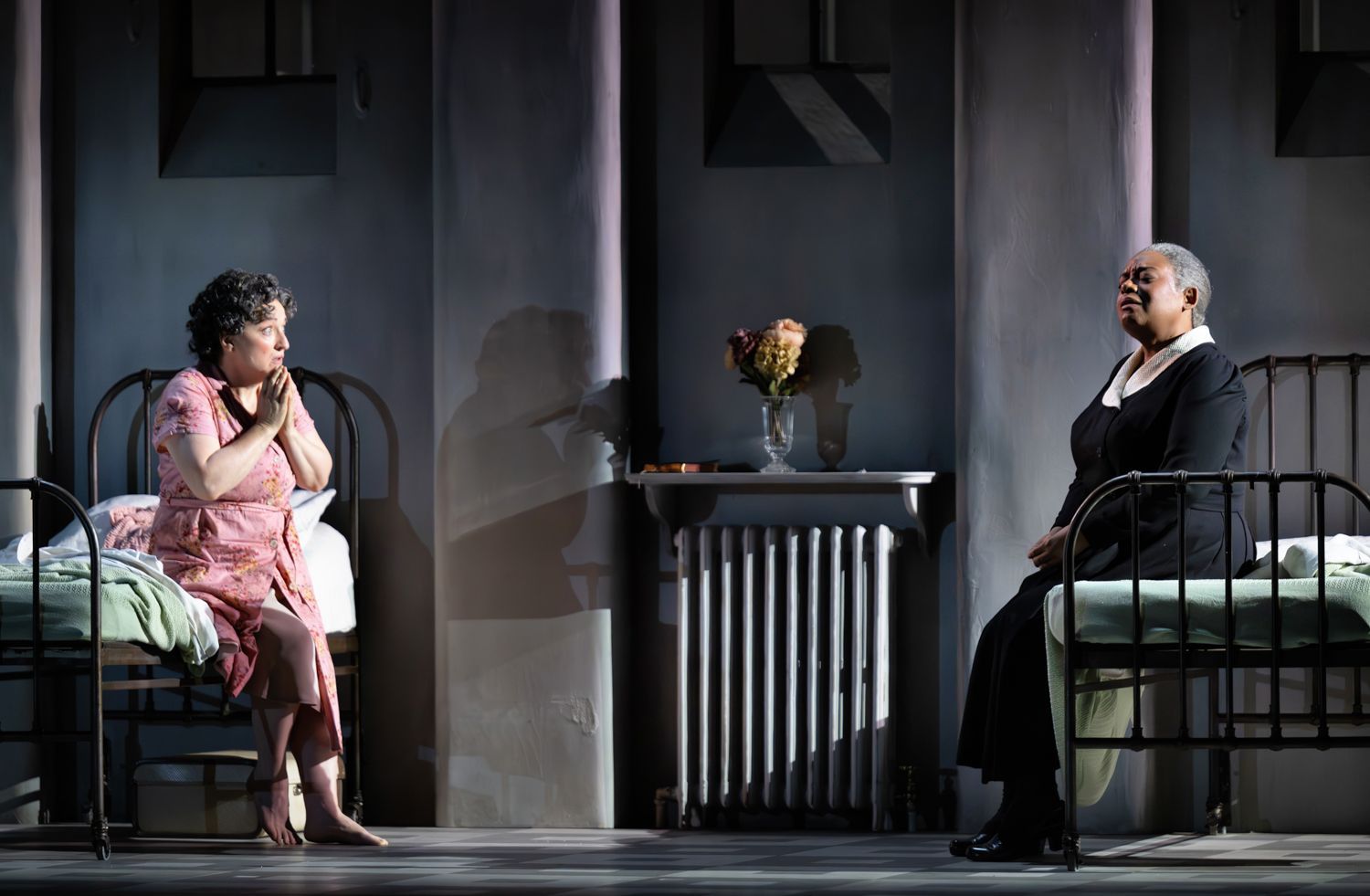 Alexandra also liked Annilese Miskimmon’s ENO semi-staging of Puccini’s Suor Angelica, which happened to be my turkey of the year (and what is the company playing at with its as yet nebulous plans for Manchester? There was no mention of London in its press release.). You couldn’t expect another Irish phenomenon, Sinéad Campbell Wallace, to sing her heart out in the lacerating role of the tortured nun given a final rehearsal and two performances in a single day, and the role didn’t seem to me to fit her. Quite unlike her stunning success in Strauss’s Salome, in Irish National Opera’s follow up to its superb Rosenkavalier, with Bruno Ravella’s vision consistently surprising. Only the characterisation of the Jokanaan lowered the temperature a little, but how the Dublin audience went wild at the end – Campbell Wallace received a rock-star ovation.
Alexandra also liked Annilese Miskimmon’s ENO semi-staging of Puccini’s Suor Angelica, which happened to be my turkey of the year (and what is the company playing at with its as yet nebulous plans for Manchester? There was no mention of London in its press release.). You couldn’t expect another Irish phenomenon, Sinéad Campbell Wallace, to sing her heart out in the lacerating role of the tortured nun given a final rehearsal and two performances in a single day, and the role didn’t seem to me to fit her. Quite unlike her stunning success in Strauss’s Salome, in Irish National Opera’s follow up to its superb Rosenkavalier, with Bruno Ravella’s vision consistently surprising. Only the characterisation of the Jokanaan lowered the temperature a little, but how the Dublin audience went wild at the end – Campbell Wallace received a rock-star ovation.
INO won another, smaller-scale race with the third in its series of Vivaldi operas, L’Olimpiade, an entertainment with surprising high points and without a single less than excellent singer among the cast of seven, Peter Whelan and the Irish Baroque Orchestra making the whole thing rock as expected. Given a handsomely conceived production by Daisy Evans with designs by Molly O’Cathain and Jake Wiltshire's chameleonic lighting, this was even more of a winner than 2022’s Bajazet. 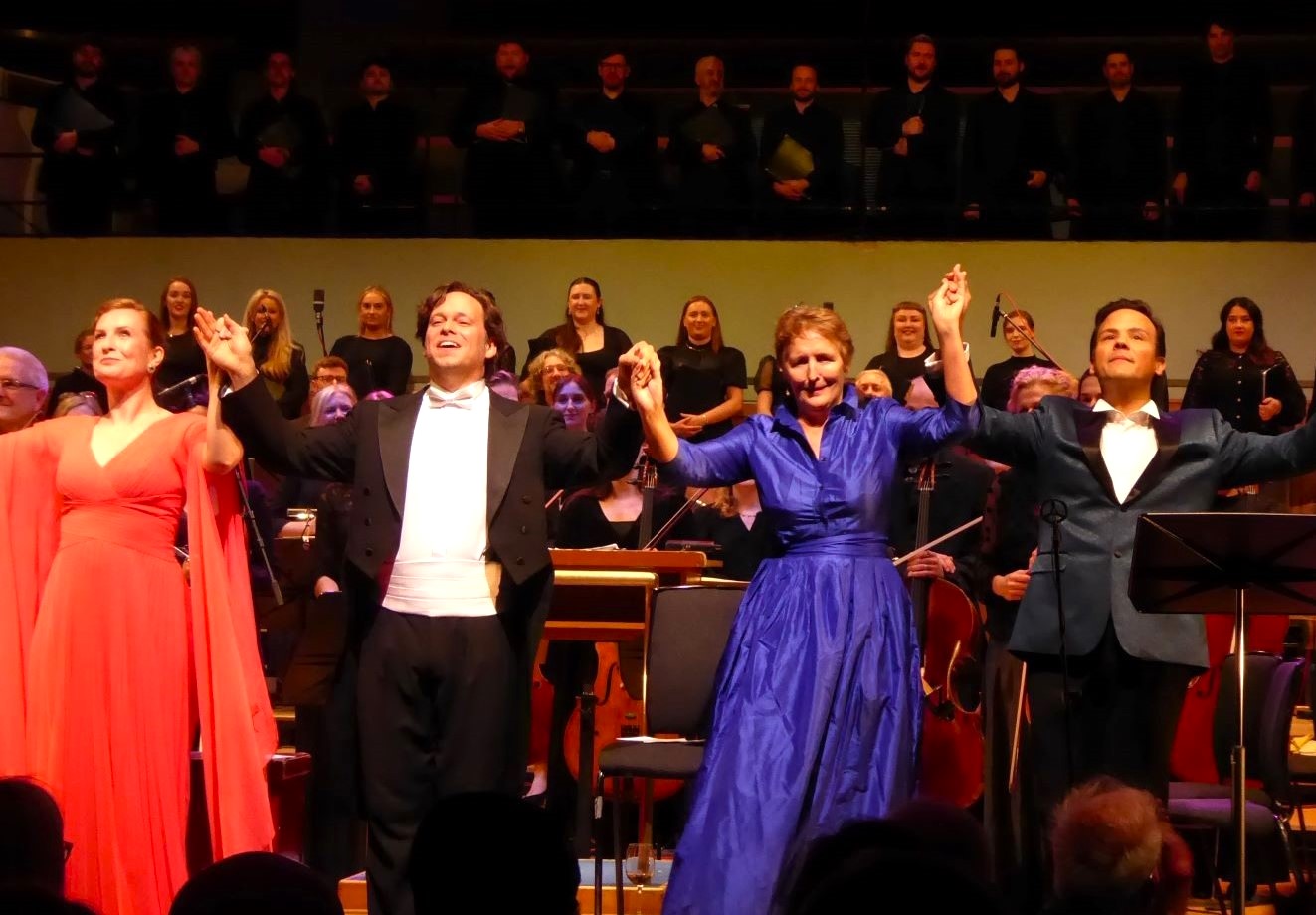
More of the perfect casting at which INO seems to excel graced the company’s last production of the year, a refreshingly disciplined take on Verdi’s Rigoletto, but there was no doubt that the vocal perfection and dramatic commitment of Soraya Mafi as Gilda (pictured below by Patrick Redmond) took us to new heights in 2024. Boyd Tonkin was enthralled by the 14th revival of “the Miller Rigoletto” at ENO: as he writes, “we already know about Richard Farnes’s undimmed gifts as an opera conductor, and he, along with revival director Elaine-Tyler Hall” helped to make this a treat – “evidence of how, and why, a high-concept production can really work.” 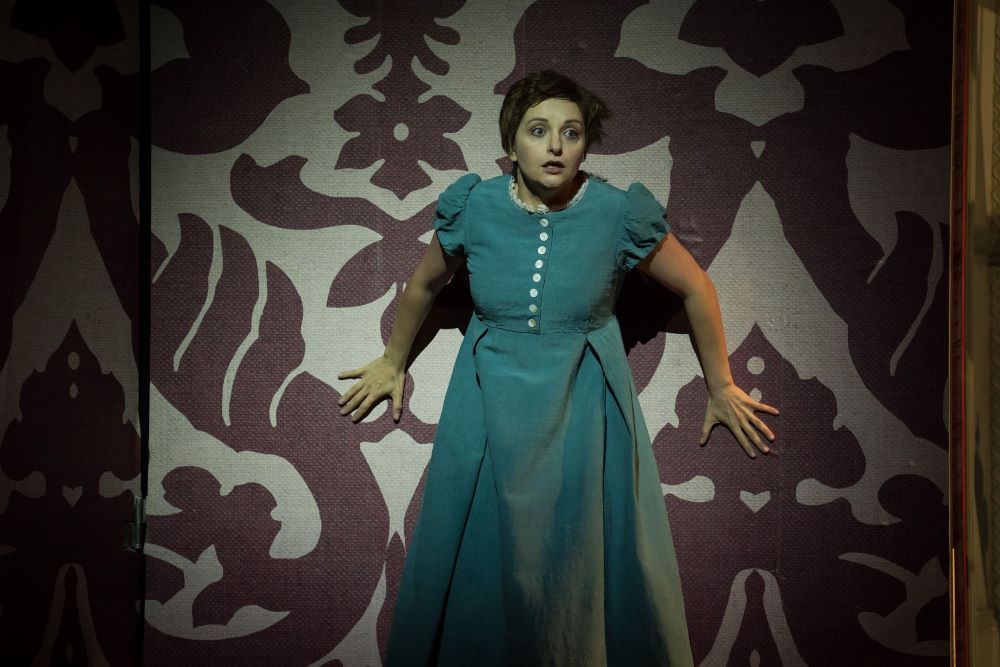 Mafi came to INO fresh from another Gilda for Welsh National Opera, much admired by Stephen Walsh. His choices from the company’s work lay elsewhere: “two evenings stand out from a company whose scurvy treatment by the Arts Council must rank as the artistic scandal of the year, admittedly against some pretty hot competition. Olivia Fuchs's staging of Death in Venice [reviewed here by Mark Kidel] , which I couldn't review because the main lead was sung by my son-in-law, I shall shamelessly call the best staged Britten I've seen since Louisa Muller's Garsington Turn of the Screw five years ago. And David McVicar's Trittico, brought from Glasgow in June and already revived in the autumn, made nonsense of the tendency to belittle Puccini's awkward but fascinating threesome.”
Mafi came to INO fresh from another Gilda for Welsh National Opera, much admired by Stephen Walsh. His choices from the company’s work lay elsewhere: “two evenings stand out from a company whose scurvy treatment by the Arts Council must rank as the artistic scandal of the year, admittedly against some pretty hot competition. Olivia Fuchs's staging of Death in Venice [reviewed here by Mark Kidel] , which I couldn't review because the main lead was sung by my son-in-law, I shall shamelessly call the best staged Britten I've seen since Louisa Muller's Garsington Turn of the Screw five years ago. And David McVicar's Trittico, brought from Glasgow in June and already revived in the autumn, made nonsense of the tendency to belittle Puccini's awkward but fascinating threesome.”
Scottish Opera has had a slimline but good year, with Miranda Heggie loving another Britten hit, Albert Herring. It wasn’t the best of times for the Royal Opera, with favoured director Damiano Michieletto’s Carmen tepid and his Tales of Hoffmann overstuffed (but that was also a question of the composite Offenbach edition used). Rachel Halliburton did thrill to a revival: “the shadow of Nosferatu hung heavily over Tim Albery’s powerfully austere staging of Wagner’s The Flying Dutchman, with Bryn Terfel the quaking heart of the production”. 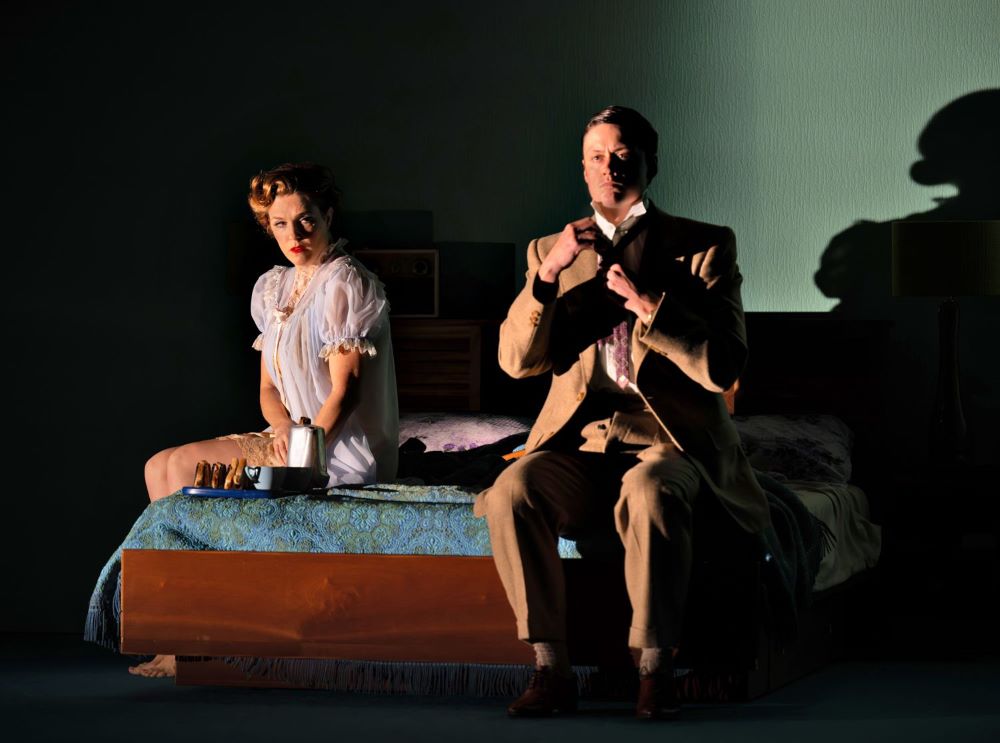 The company’s boldest effort came in the Linbury Theatre, where Oliver Mears tackled both Bernstein’s one-act masterpiece of marital dysfunction, Trouble in Tahiti, and its much later, longer sequel A Quiet Place. Having devoted five Zoom lectures to both, I reckon I know what could be done to make the latter work – it didn’t, quite - but the casting was ideal. Wallis Giunta gave us a very different Dinah from her stunning Broadway turn for Opera North, but the revelation was young baritone Henry Neill as both her husband Sam (pictured above by Bill Knight with Giunta) and, in the second opera, her grown-up son Junior .
The company’s boldest effort came in the Linbury Theatre, where Oliver Mears tackled both Bernstein’s one-act masterpiece of marital dysfunction, Trouble in Tahiti, and its much later, longer sequel A Quiet Place. Having devoted five Zoom lectures to both, I reckon I know what could be done to make the latter work – it didn’t, quite - but the casting was ideal. Wallis Giunta gave us a very different Dinah from her stunning Broadway turn for Opera North, but the revelation was young baritone Henry Neill as both her husband Sam (pictured above by Bill Knight with Giunta) and, in the second opera, her grown-up son Junior .
The best possible case was made by director Sarah Fahie for another not-quite-masterpiece, Sarah Angliss's Giant, finally reaching London. Bernard Hughes thought English Touring Opera might have made a good case for Judith Weir’s Blond Ekbert, also first seen at the Aldeburgh Festival, as a contemporary classic, “presented in its lean presented in its stripped-back ‘pocket version’, which I really like”. 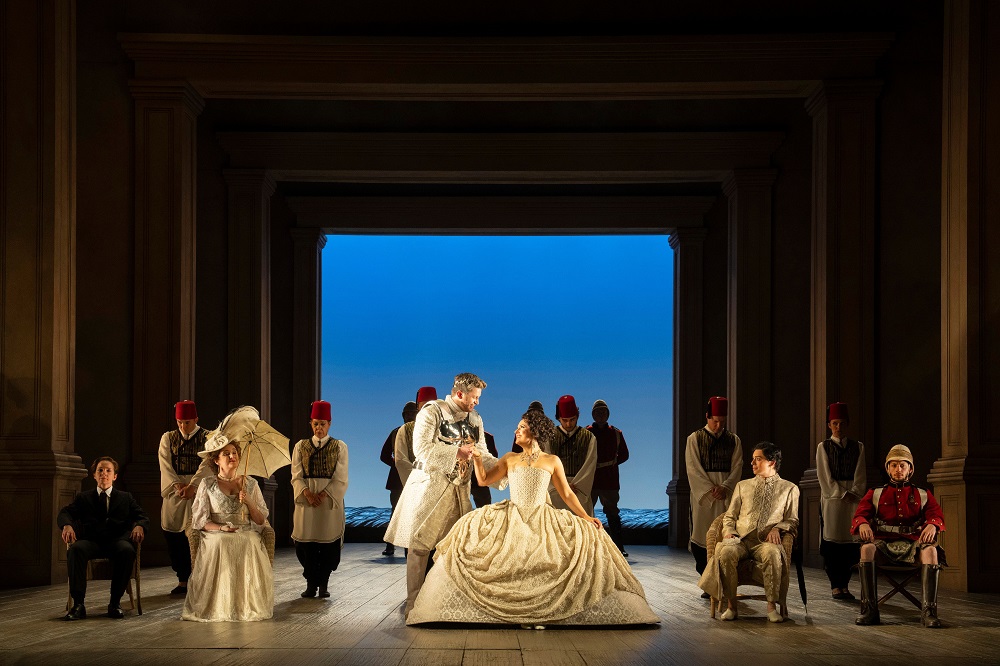 Glyndebourne had a good season, albeit with few new challenges. Robin Ticciati’s conducting of Tristan und Isolde marked his growing status as a top Wagnerian, boding well for Parsifal next season (the orchestral aspect was also the best thing about the completion of Vladimir Jurowski’s concert-staging Ring at the Royal Festival Hall). But it was 10s across the board for the latest revival of the company's classic Handel Giulio Cesare, the casting of countertenor Ariyeh Nussbaum Cohen in the title role (pictured above centre with Louise Alder's Cleopatra by Richard Hubert Smith) paying off. Blackwater Valley Opera couldn’t compete with Glyndebourne for stage resources, but did a good job with a strong cast earlier in the year.
Glyndebourne had a good season, albeit with few new challenges. Robin Ticciati’s conducting of Tristan und Isolde marked his growing status as a top Wagnerian, boding well for Parsifal next season (the orchestral aspect was also the best thing about the completion of Vladimir Jurowski’s concert-staging Ring at the Royal Festival Hall). But it was 10s across the board for the latest revival of the company's classic Handel Giulio Cesare, the casting of countertenor Ariyeh Nussbaum Cohen in the title role (pictured above centre with Louise Alder's Cleopatra by Richard Hubert Smith) paying off. Blackwater Valley Opera couldn’t compete with Glyndebourne for stage resources, but did a good job with a strong cast earlier in the year.
Whatever reservations one might have had about the new Carmen at Glyndebourne, its Proms version blew us all away, with fabulous use of the Royal Albert Hall and the exciting thought that there would have been many folk in the audience seeing the opera for the first time: it must have been even more electrifying for them (the Act 2 Quintet pictured below by Andy Paradise). Garsington excelled in revived Mozart, with another standout performance from Samantha Clarke as the Countess in The Marriage of Figaro; Ed Vulliamy loved The Mozartists' concert performance in London's Cadogan Hall. 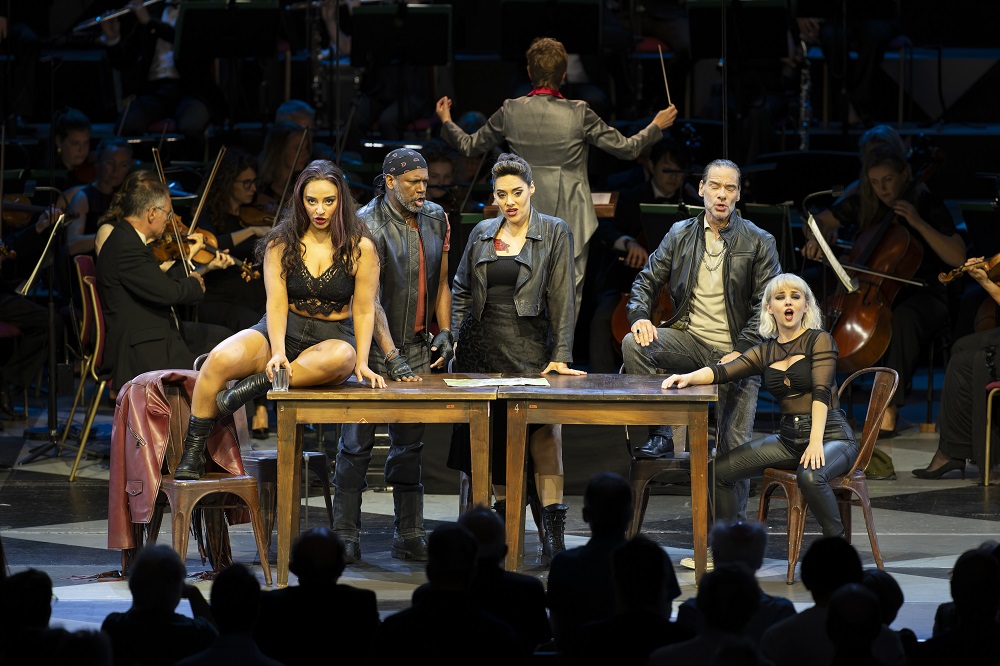 Abroad, Boyd felt lucky to get to see Lohengrin in Strasbourg from the Opéra National du Rhin: “Michael Spyres seems to annoy some old-school Wagnerians, but the star American “baritenor” rose to the challenge of the title role in Strasbourg with grace, lustre and authority, while Aziz Shokhakimov proclaimed his huge conducting promise”. Although Britain has largely ignored it, the 150th anniversary year of Smetana’s death was a revelation for me, thanks to all the operas being performed in the composer’s lovely home town of Litomyšl. I caught thee stagings of varying quality, musical values high throughout, and a simply perfect concert performance of the festival masterpiece Libuše conducted by the great Jakub Hrůša. There’s no doubt he will follow in Antonio Pappano’s footsteps at the Royal Opera in high style.
Abroad, Boyd felt lucky to get to see Lohengrin in Strasbourg from the Opéra National du Rhin: “Michael Spyres seems to annoy some old-school Wagnerians, but the star American “baritenor” rose to the challenge of the title role in Strasbourg with grace, lustre and authority, while Aziz Shokhakimov proclaimed his huge conducting promise”. Although Britain has largely ignored it, the 150th anniversary year of Smetana’s death was a revelation for me, thanks to all the operas being performed in the composer’s lovely home town of Litomyšl. I caught thee stagings of varying quality, musical values high throughout, and a simply perfect concert performance of the festival masterpiece Libuše conducted by the great Jakub Hrůša. There’s no doubt he will follow in Antonio Pappano’s footsteps at the Royal Opera in high style.
Last, but first in terms of sheer sharp-edged hilarity, Wexford Festival Opera struck comic gold in Orpha Phelan's constantly witty staging of Donizetti’s Le convenienze ed inconvenienze teatrali, which should really go permanently by its sometime name Viva la Mamma, for it showcases a great drag role for baritone as the stage mother from hell. Paolo Bordogna pulled out every trick in the book, and didn’t overshadow the prima donna, Sharleen Joynt, who capped Donizetti and Rossini numbers with a stupendous “Glitter and Be Gay” from Bernstein’s Candide. I hope you laugh as much as I did when you watch it – as you must, it’s perfect panto-plus fare – on OperaVision.
Watch Wexford Festival Opera's 'Le convenienze ed inconvenienze teatrali' on OperaVision
Explore topics
Share this article
The future of Arts Journalism
You can stop theartsdesk.com closing!
We urgently need financing to survive. Our fundraising drive has thus far raised £49,000 but we need to reach £100,000 or we will be forced to close. Please contribute here: https://gofund.me/c3f6033d
And if you can forward this information to anyone who might assist, we’d be grateful.

Subscribe to theartsdesk.com
Thank you for continuing to read our work on theartsdesk.com. For unlimited access to every article in its entirety, including our archive of more than 15,000 pieces, we're asking for £5 per month or £40 per year. We feel it's a very good deal, and hope you do too.
To take a subscription now simply click here.
And if you're looking for that extra gift for a friend or family member, why not treat them to a theartsdesk.com gift subscription?
more Opera
 BBC Proms: The Marriage of Figaro, Glyndebourne Festival review - merriment and menace
Strong Proms transfer for a robust and affecting show
BBC Proms: The Marriage of Figaro, Glyndebourne Festival review - merriment and menace
Strong Proms transfer for a robust and affecting show
 BBC Proms: Suor Angelica, LSO, Pappano review - earthly passion, heavenly grief
A Sister to remember blesses Puccini's convent tragedy
BBC Proms: Suor Angelica, LSO, Pappano review - earthly passion, heavenly grief
A Sister to remember blesses Puccini's convent tragedy
 Orpheus and Eurydice, Opera Queensland/SCO, Edinburgh International Festival 2025 review - dazzling, but distracting
Eye-popping acrobatics don’t always assist in Gluck’s quest for operatic truth
Orpheus and Eurydice, Opera Queensland/SCO, Edinburgh International Festival 2025 review - dazzling, but distracting
Eye-popping acrobatics don’t always assist in Gluck’s quest for operatic truth
 MARS, Irish National Opera review - silly space oddity with fun stretches
Cast, orchestra and production give Jennifer Walshe’s bold collage their all
MARS, Irish National Opera review - silly space oddity with fun stretches
Cast, orchestra and production give Jennifer Walshe’s bold collage their all
 Káťa Kabanová, Glyndebourne review - emotional concentration in a salle modulable
Janáček superbly done through or in spite of the symbolism
Káťa Kabanová, Glyndebourne review - emotional concentration in a salle modulable
Janáček superbly done through or in spite of the symbolism
 Buxton International Festival 2025 review - a lavish offering of smaller-scale work
Allison Cook stands out in a fascinating integrated double bill of Bernstein and Poulenc
Buxton International Festival 2025 review - a lavish offering of smaller-scale work
Allison Cook stands out in a fascinating integrated double bill of Bernstein and Poulenc
 Tosca, Clonter Opera review - beauty and integrity in miniature
Happy surprises and a convincing interpretation of Puccini for today
Tosca, Clonter Opera review - beauty and integrity in miniature
Happy surprises and a convincing interpretation of Puccini for today
 Hamlet, Buxton International Festival review - how to re-imagine re-imagined Shakespeare
Music comes first in very 19th century, very Romantic, very French operatic creation
Hamlet, Buxton International Festival review - how to re-imagine re-imagined Shakespeare
Music comes first in very 19th century, very Romantic, very French operatic creation
 Falstaff, Glyndebourne review - knockabout and nostalgia in postwar Windsor
A fat knight to remember, and snappy stagecraft, overcome some tedious waits
Falstaff, Glyndebourne review - knockabout and nostalgia in postwar Windsor
A fat knight to remember, and snappy stagecraft, overcome some tedious waits
 Salome, LSO, Pappano, Barbican review - a partnership in a million
Asmik Grigorian is vocal perfection in league with a great conductor and orchestra
Salome, LSO, Pappano, Barbican review - a partnership in a million
Asmik Grigorian is vocal perfection in league with a great conductor and orchestra
 Semele, Royal Opera review - unholy smoke
Style comes and goes in a justifiably dark treatment of Handelian myth
Semele, Royal Opera review - unholy smoke
Style comes and goes in a justifiably dark treatment of Handelian myth
 Le nozze di Figaro, Glyndebourne review - perceptive humanity in period setting
Mostly glorious cast, sharp ideas, fussy conducting
Le nozze di Figaro, Glyndebourne review - perceptive humanity in period setting
Mostly glorious cast, sharp ideas, fussy conducting

Add comment